For over a decade, Jim Killen has served as the science fiction and fantasy book buyer for Barnes & Noble. Every month on the B&N Sci-Fi & Fantasy Blog and Tor.com, Jim shares his curated list of the month’s can’t-miss new SF/F releases.
Star Wars Battlefront: Twilight Company, by Alexander Freed (November 3, LucasBooks—Hardcover)
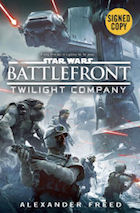 The latest novel in the Star Wars Expanded Universe treads new ground for the series. Like the same-titled video game that inspired it, Battlefront puts you on the ground with the Rebel Alliance during the a few of the most iconic skirmishes of the original trilogy. Ever wonder what it was like to be one of those hapless soldiers defending the Hoth base against clanking AT-ATs? Find out when you meet the grizzled veterans of Twilight Company, led by the gruff, cynical, battle-hardened Namir, who must rely on the word of an Imperial traitor if he hopes to win the day for the Rebels. A regular writer for LucasArts games, Freed brings a strong sense of verisimilitude to the you-are-there combat scenes that carry the book along like a sprinting tauntaun.
The latest novel in the Star Wars Expanded Universe treads new ground for the series. Like the same-titled video game that inspired it, Battlefront puts you on the ground with the Rebel Alliance during the a few of the most iconic skirmishes of the original trilogy. Ever wonder what it was like to be one of those hapless soldiers defending the Hoth base against clanking AT-ATs? Find out when you meet the grizzled veterans of Twilight Company, led by the gruff, cynical, battle-hardened Namir, who must rely on the word of an Imperial traitor if he hopes to win the day for the Rebels. A regular writer for LucasArts games, Freed brings a strong sense of verisimilitude to the you-are-there combat scenes that carry the book along like a sprinting tauntaun.
Black Wolves, by Kate Elliott (November 3, Orbit—Paperback)
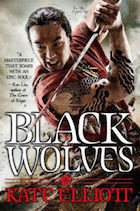 The start of a new epic trilogy from Kate Elliott, set in the same world as her Crossroads trilogy. Twenty-two years after Dannarah lost her beloved brother Atani to a murderous plot, she’s faced with a choice: the standing king wants her to bring Captain Kellas, the former leader of Atani’s Black Wolves, back to the palace in order to protect him from being cut down like his father. Dannarah, now older and a powerful and influential Marshall, is reluctant to bring Kellas back from his self-imposed exile in the wake of Atani’s death. But the Hundred is more complicated and chaotic than ever, and politics force Dannarah to make a choice between old grudges and her professional ambitions. The choice will lead her back to Kellas and to truths about her family legacy that will change her world forever.
The start of a new epic trilogy from Kate Elliott, set in the same world as her Crossroads trilogy. Twenty-two years after Dannarah lost her beloved brother Atani to a murderous plot, she’s faced with a choice: the standing king wants her to bring Captain Kellas, the former leader of Atani’s Black Wolves, back to the palace in order to protect him from being cut down like his father. Dannarah, now older and a powerful and influential Marshall, is reluctant to bring Kellas back from his self-imposed exile in the wake of Atani’s death. But the Hundred is more complicated and chaotic than ever, and politics force Dannarah to make a choice between old grudges and her professional ambitions. The choice will lead her back to Kellas and to truths about her family legacy that will change her world forever.
Chimera, by Mira Grant (November 24, Orbit—Hardcover)
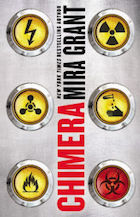 The concluding volume of Grant’s Parasitology trilogy pulls no punches, exploring the ramifications of an entire race of humans controlled by implanted tapeworms that provide their hosts enhanced capabilities and health, but now are attaining sentience and their own identities. Told from the point of view of Sal, a tapeworm that has taken on the identity of its host human, Grant’s novel shows us a world falling into chaos as some parasitese turn their hosts into sleepwalking zombies, while others seek to use their hijacked bodies to take control of everything. With a twisty plot and plenty of classic apocalyptic thrills, Chimera is not only a satisfying conclusion to the series, it’s arguably the best book of the trilogy.
The concluding volume of Grant’s Parasitology trilogy pulls no punches, exploring the ramifications of an entire race of humans controlled by implanted tapeworms that provide their hosts enhanced capabilities and health, but now are attaining sentience and their own identities. Told from the point of view of Sal, a tapeworm that has taken on the identity of its host human, Grant’s novel shows us a world falling into chaos as some parasitese turn their hosts into sleepwalking zombies, while others seek to use their hijacked bodies to take control of everything. With a twisty plot and plenty of classic apocalyptic thrills, Chimera is not only a satisfying conclusion to the series, it’s arguably the best book of the trilogy.
Death Wave, by Ben Bova (November 17, Tor Books—Hardcover)
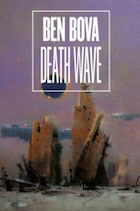 In Bova’s sequel to New Earth, Jordan Kell returns to Earth with the horrific news that a catastrophic explosion in the center of the galaxy has generated a wave of lethal radiation spreading slowly throughout the universe. With the Death Wave scheduled to arrive at Earth in 2,000 years, Jordan knows the planet will figure out how to survive—but other pre-technological species won’t, unless they are warned and assisted. But the Earth Kell returns to is much changed from the one he left decades prior, and his grim news sets off an explosion of political intrigue and nefarious plotting that puts the future of the entire galaxy into question.
In Bova’s sequel to New Earth, Jordan Kell returns to Earth with the horrific news that a catastrophic explosion in the center of the galaxy has generated a wave of lethal radiation spreading slowly throughout the universe. With the Death Wave scheduled to arrive at Earth in 2,000 years, Jordan knows the planet will figure out how to survive—but other pre-technological species won’t, unless they are warned and assisted. But the Earth Kell returns to is much changed from the one he left decades prior, and his grim news sets off an explosion of political intrigue and nefarious plotting that puts the future of the entire galaxy into question.
Green Earth, by Kim Stanley Robinson (November 3, Del Rey—Paperback)
 Robinson’s prescient cli-fi trilogy—Forty Signs of Rain, Fifty Degrees Below, and Sixty Days and Counting—has only become more powerful as real-world events continue (alarmingly) to catch up to his fiction. Collected here for the first time in an edited and updated single volume, Green Earth is the story of scientists fighting an uphill battle against politically reluctant bureaucrats to spread word of the dangers of climate change before we’re past the tipping point. Robinson combines the realism and research that have made him one of the most celebrated hard SF writers of the modern age with a real sense of urgency—urgency that has only increased as the last decade has provided clear evidence that these stories may not be considered science fiction for much longer.
Robinson’s prescient cli-fi trilogy—Forty Signs of Rain, Fifty Degrees Below, and Sixty Days and Counting—has only become more powerful as real-world events continue (alarmingly) to catch up to his fiction. Collected here for the first time in an edited and updated single volume, Green Earth is the story of scientists fighting an uphill battle against politically reluctant bureaucrats to spread word of the dangers of climate change before we’re past the tipping point. Robinson combines the realism and research that have made him one of the most celebrated hard SF writers of the modern age with a real sense of urgency—urgency that has only increased as the last decade has provided clear evidence that these stories may not be considered science fiction for much longer.
Inherit the Stars, by Tony Peak (November 3, Roc—Paperback)
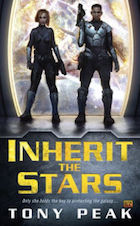 This ultra-cool retro story combines the best of old-school sci-fi with modern-day storytelling, resulting in a book perfect for fans of fantastical SF. Kivita Vondir has followed in her father’s footsteps as a salvager who hunts down the lost technology of a vanished alien race, living hard and fast as she tries to forget a broken heart. Which is difficult when she’s hired to find a legendary artifact and discovers her estranged lover, the Han Solo-esque Sar Redryll, has been put on its trail as well. When the relic grants Kivita amazing powers, the table turns, as she herself becomes the sought-after prize of competing forces: human, alien, and military.
This ultra-cool retro story combines the best of old-school sci-fi with modern-day storytelling, resulting in a book perfect for fans of fantastical SF. Kivita Vondir has followed in her father’s footsteps as a salvager who hunts down the lost technology of a vanished alien race, living hard and fast as she tries to forget a broken heart. Which is difficult when she’s hired to find a legendary artifact and discovers her estranged lover, the Han Solo-esque Sar Redryll, has been put on its trail as well. When the relic grants Kivita amazing powers, the table turns, as she herself becomes the sought-after prize of competing forces: human, alien, and military.
Last Plane to Heaven, by Jay Lake (November 17, Tor Books—Paperback)
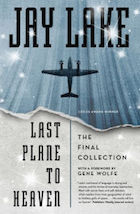 Jay Lake’s legion of faith readers was saddened by his untimely death last year, but this collection of 32 of his short stories is a fitting epitaph to a remarkable writing career and an incredible talent. With an introduction by Gene Wolfe, this collection features some of Lake’s best short fiction, offering a breathtaking range of emotions and ideas. The stories flit from space opera to fairy tale, from hilarious to heartbreaking, and from the far reaches of space to the horrors of our own bodies, all with the assurance of a writer completely in control of his craft. While the world is poorer without Lake in it, this collection offers a chance to celebrate a rare talent and enjoy some incredible stories to boot.
Jay Lake’s legion of faith readers was saddened by his untimely death last year, but this collection of 32 of his short stories is a fitting epitaph to a remarkable writing career and an incredible talent. With an introduction by Gene Wolfe, this collection features some of Lake’s best short fiction, offering a breathtaking range of emotions and ideas. The stories flit from space opera to fairy tale, from hilarious to heartbreaking, and from the far reaches of space to the horrors of our own bodies, all with the assurance of a writer completely in control of his craft. While the world is poorer without Lake in it, this collection offers a chance to celebrate a rare talent and enjoy some incredible stories to boot.
Leviathan Wakes, by James S.A. Corey (November 3, Orbit—Paperback)
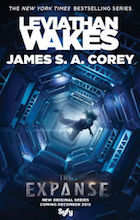 Syfy’s adaptation of the splashiest, smartest, most sensational space opera series running doesn’t premiere until December 15, which gives you just enough time to get caught up with the first few installments of the planned nine-book saga. This debut follows James Holden and the crew of the Rocinante as they work to prevent a war between Earth, Mars, and the Outer Planets Alliance that has something to do with a missing girl named Julie Mao and Detective Miller, the man obsessed with finding her, even if he has to pull the solar system down around him to do it.
Syfy’s adaptation of the splashiest, smartest, most sensational space opera series running doesn’t premiere until December 15, which gives you just enough time to get caught up with the first few installments of the planned nine-book saga. This debut follows James Holden and the crew of the Rocinante as they work to prevent a war between Earth, Mars, and the Outer Planets Alliance that has something to do with a missing girl named Julie Mao and Detective Miller, the man obsessed with finding her, even if he has to pull the solar system down around him to do it.
Made to Kill, by Adam Christopher (November 3, Tor Books—Hardcover)
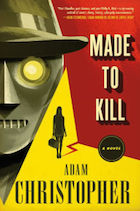 The latest novel from the genre-hopping Christopher is a delightful mashup of Raymond Chandler and robots. In an alternate 1940s-era Hollywood, Ray is a sentient robot detective, the last of his kind following a machine uprising that resulted in the extermination of (almost) all artificial intelligence. With only a day’s worth of storage in his memory banks, Ray takes on cases with the help of his pragmatic computer secretary Ada, which seems to be working out well…until he begins to suspect that his current case is no simple payday. A missing Hollywood starlet, an unexplained pile of radioactive gold, and circling Soviet agents (because of course) are nothing against the real threat in Ray’s mind: what isn’t Ada telling him about his past, and can she be trusted?
The latest novel from the genre-hopping Christopher is a delightful mashup of Raymond Chandler and robots. In an alternate 1940s-era Hollywood, Ray is a sentient robot detective, the last of his kind following a machine uprising that resulted in the extermination of (almost) all artificial intelligence. With only a day’s worth of storage in his memory banks, Ray takes on cases with the help of his pragmatic computer secretary Ada, which seems to be working out well…until he begins to suspect that his current case is no simple payday. A missing Hollywood starlet, an unexplained pile of radioactive gold, and circling Soviet agents (because of course) are nothing against the real threat in Ray’s mind: what isn’t Ada telling him about his past, and can she be trusted?
Planetfall, by Emma Newman (November 3, Roc—Paperback)
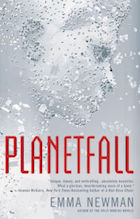 Hugo-nominated podcaster Newman follows up her popular Split Worlds fantasy series with a stunning piece of social science fiction set on a remote human colony world. Lee Suh-Mi, a scientist who believes she received visions of a distant planet, inspired an almost religious fervor in her followers and managed to fund a deep space expedition to locate it. It turns out the planet does exist, but what awaited them on the surface was far more alien than anyone imagined. 20 years later, life in the colony has developed into something approaching routine—for everyone, that is, but Ren, Suh-mi’s lover, and one of only two people who knows what tragedy really occurred the day they made planetfall. As much a wrenching portrait of mental illness as it is a compelling SF mystery, this is one of the year’s best books.
Hugo-nominated podcaster Newman follows up her popular Split Worlds fantasy series with a stunning piece of social science fiction set on a remote human colony world. Lee Suh-Mi, a scientist who believes she received visions of a distant planet, inspired an almost religious fervor in her followers and managed to fund a deep space expedition to locate it. It turns out the planet does exist, but what awaited them on the surface was far more alien than anyone imagined. 20 years later, life in the colony has developed into something approaching routine—for everyone, that is, but Ren, Suh-mi’s lover, and one of only two people who knows what tragedy really occurred the day they made planetfall. As much a wrenching portrait of mental illness as it is a compelling SF mystery, this is one of the year’s best books.
Reap the Wind, by Karen Chance (November 3, Signet—Paperback)
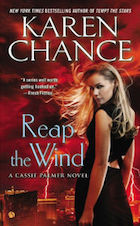 The seventh volume of Chance’s Cassie Palmer series once again places us front-and-center with Cassie, one of those most engaging, intelligent, and reliably entertaining POV characters in modern urban fantasy. The story is expectedly complex for a late-series entry, as Palmer, a half-goddess Pythian Seer, babysits Pythian initiates, flees and fights Pythian Acolytes determined to summon an old god no matter the catastrophic consequences, and struggles to save the soul of her friend Pritkin.
The seventh volume of Chance’s Cassie Palmer series once again places us front-and-center with Cassie, one of those most engaging, intelligent, and reliably entertaining POV characters in modern urban fantasy. The story is expectedly complex for a late-series entry, as Palmer, a half-goddess Pythian Seer, babysits Pythian initiates, flees and fights Pythian Acolytes determined to summon an old god no matter the catastrophic consequences, and struggles to save the soul of her friend Pritkin.
Shadow of Empire, by Jay Allan (November 3, Harper Voyager—Paperback)
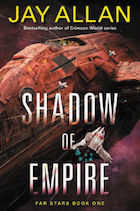 If the phrase “space pirates” doesn’t get your blood pumping, you may need medical attention. The first book in Allan’s Far Stars trilogy has all the ingredients of a fantastic adventure story, from a charismatic mercenary haunted by his past to the political intrigue that twists the story when you least expect it. Arkarin Blackhawk is captain of the Wolf’s Claw, whose crew live on the edges of civilization in the Far Stars. When an old friend asks him to rescue his daughter from pirates, Blackhawk can’t say no—but the mission sends the crew of freelance adventurers into deeper waters than they expect, and they soon become embroiled in a planetary civil war and wrapped up in political intrigue between a nascent federation of Far Stars planets and the Imperial forces that dominate the area. An old-fashioned adventure set in a detailed, unique universe, Shadow of Empire kicks off a new series in fine style.
If the phrase “space pirates” doesn’t get your blood pumping, you may need medical attention. The first book in Allan’s Far Stars trilogy has all the ingredients of a fantastic adventure story, from a charismatic mercenary haunted by his past to the political intrigue that twists the story when you least expect it. Arkarin Blackhawk is captain of the Wolf’s Claw, whose crew live on the edges of civilization in the Far Stars. When an old friend asks him to rescue his daughter from pirates, Blackhawk can’t say no—but the mission sends the crew of freelance adventurers into deeper waters than they expect, and they soon become embroiled in a planetary civil war and wrapped up in political intrigue between a nascent federation of Far Stars planets and the Imperial forces that dominate the area. An old-fashioned adventure set in a detailed, unique universe, Shadow of Empire kicks off a new series in fine style.
Skyborn, by David Dalglish (November 17, Orbit—Paperback)
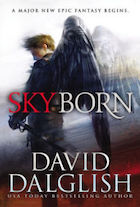 Dalglish’s new fantasy series begins 500 years after a disaster forced humanity to abandon the surface and take to the skies to inhabit a chain of islands floating above treacherous seas. Orphaned twins Bree and Kael Skyborn lost their parents in an attack on their home, and ever since, they’ve aspired to join the ranks of the Seraphim, the winged warriors who defend their island against external threats. As the two struggle to master their unique powers, a war is brewing between the islands, setting the stakes for a trilogy that promises to be filled with intense aerial action and engaging political machinations.
Dalglish’s new fantasy series begins 500 years after a disaster forced humanity to abandon the surface and take to the skies to inhabit a chain of islands floating above treacherous seas. Orphaned twins Bree and Kael Skyborn lost their parents in an attack on their home, and ever since, they’ve aspired to join the ranks of the Seraphim, the winged warriors who defend their island against external threats. As the two struggle to master their unique powers, a war is brewing between the islands, setting the stakes for a trilogy that promises to be filled with intense aerial action and engaging political machinations.
Solar Express, by L.E. Modesitt, Jr. (November 3, Tor Books—Hardcover)
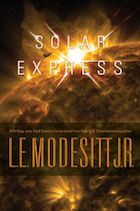 Modesitt returns to science fiction with a remarkable book set in a future where dwindling resources and climate change on Earth have prompted the world powers to militarize space much in the way we might see the militarization of the Arctic in the nearer term. When a mysterious object, rich in nickel and silver and headed for the sun, is spotted by moon-based astrophysicist Dr. Alayna Wong-Grant, a scramble to control it prompts Capt. Chris Tavoian to volunteer for an intercept mission. As the object draws closer, however, it resolves into an artificial construct accelerating towards the star. The story is told mainly through correspondence between Tavoian and Wong-Grant, spinning out the mystery of what the UFO really is, and how it will affect a dying world and the people trying to observe, understand, or control it.
Modesitt returns to science fiction with a remarkable book set in a future where dwindling resources and climate change on Earth have prompted the world powers to militarize space much in the way we might see the militarization of the Arctic in the nearer term. When a mysterious object, rich in nickel and silver and headed for the sun, is spotted by moon-based astrophysicist Dr. Alayna Wong-Grant, a scramble to control it prompts Capt. Chris Tavoian to volunteer for an intercept mission. As the object draws closer, however, it resolves into an artificial construct accelerating towards the star. The story is told mainly through correspondence between Tavoian and Wong-Grant, spinning out the mystery of what the UFO really is, and how it will affect a dying world and the people trying to observe, understand, or control it.
Warheart, by Terry Goodkind (November 17, Tor Books—Hardcover)
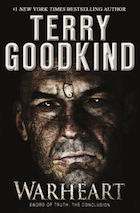 The fourth, concluding entry in Goodkind’s Richard and Kahlan series begins where all climactic stories should: with the heroes at their wit’s end and all hope lost. The D’Haran Empire is on the verge of total destruction and Richard Rahl is surely doomed—but Kahlan Amnell, the Last Confessor, is still in play, and she has one last trick that might save not only the empire, but Rahl as well, one that will transform the world in ways no one can predict. Goodkind gathers all the threads he’s been spinning and weaves them into a conclusion that’s equal parts exciting, surprising, and emotionally powerful.
The fourth, concluding entry in Goodkind’s Richard and Kahlan series begins where all climactic stories should: with the heroes at their wit’s end and all hope lost. The D’Haran Empire is on the verge of total destruction and Richard Rahl is surely doomed—but Kahlan Amnell, the Last Confessor, is still in play, and she has one last trick that might save not only the empire, but Rahl as well, one that will transform the world in ways no one can predict. Goodkind gathers all the threads he’s been spinning and weaves them into a conclusion that’s equal parts exciting, surprising, and emotionally powerful.
Going Dark, by Linda Nagata (November 3, Saga Press—Paperback)
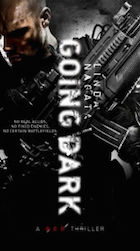 The final volume of Nagata’s The Red trilogy completes an impressive military SF series. Lieutenant James Shelly is believed dead, which provides him the perfect cover story to finally figure out how to deal with The Red, the AI ghost in the machine that has been plaguing him and his compatriots (not to mention setting off a global conflict or two) over two action packed prior volumes. As much a consideration of the emergence of an artificial intelligence as an action-packed political thriller, The Red trilogy is unparalleled among modern milSF.
The final volume of Nagata’s The Red trilogy completes an impressive military SF series. Lieutenant James Shelly is believed dead, which provides him the perfect cover story to finally figure out how to deal with The Red, the AI ghost in the machine that has been plaguing him and his compatriots (not to mention setting off a global conflict or two) over two action packed prior volumes. As much a consideration of the emergence of an artificial intelligence as an action-packed political thriller, The Red trilogy is unparalleled among modern milSF.
This post was published simultaneously on the B&N Sci-Fi & Fantasy Blog.











Good month for Sci Fi fans! BTW; Reap the wind was Brilliant and fun!